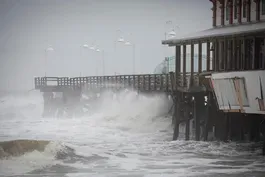
NYT finds no link between many deportees and Tren de Aragua
Clip: 5/3/2025 | 5m 45sVideo has Closed Captions
NYT investigation finds no evidence linking many deported Venezuelans to Tren de Aragua
In March, in order to speedily deport 238 Venezuelan men under the Alien Enemies Act of 1798, Trump claimed they were members of a transnational criminal organization called Tren de Aragua. But an investigation by the New York Times couldn’t find any evidence linking many of the men to that gang. Ali Rogin speaks with Julie Turkewitz, the lead reporter on that investigation, for more.
Problems with Closed Captions? Closed Captioning Feedback
Problems with Closed Captions? Closed Captioning Feedback
Major corporate funding for the PBS News Hour is provided by BDO, BNSF, Consumer Cellular, American Cruise Lines, and Raymond James. Funding for the PBS NewsHour Weekend is provided by...

NYT finds no link between many deportees and Tren de Aragua
Clip: 5/3/2025 | 5m 45sVideo has Closed Captions
In March, in order to speedily deport 238 Venezuelan men under the Alien Enemies Act of 1798, Trump claimed they were members of a transnational criminal organization called Tren de Aragua. But an investigation by the New York Times couldn’t find any evidence linking many of the men to that gang. Ali Rogin speaks with Julie Turkewitz, the lead reporter on that investigation, for more.
Problems with Closed Captions? Closed Captioning Feedback
How to Watch PBS News Hour
PBS News Hour is available to stream on pbs.org and the free PBS App, available on iPhone, Apple TV, Android TV, Android smartphones, Amazon Fire TV, Amazon Fire Tablet, Roku, Samsung Smart TV, and Vizio.
Providing Support for PBS.org
Learn Moreabout PBS online sponsorshipJOHN YANG: In March, in order to speedily deport 238 Venezuelan men under an 18th century law, President Trump declared many of them to be alien enemies.
He claimed they were members of a transnational criminal organization called Tren de Aragua, which he said was conducting irregular warfare and undertaking hostile actions against the United States.
But a New York Times investigation couldn't find any evidence linking many of the men to that gang.
Ali Rogin spoke with Julie Turkewitz, the Times Andes bureau chief based in Bogota, Colombia, and the lead reporter on that investigation.
ALI ROGIN: Thank you so much for joining us.
In your investigation for how many of these 238 men did you find connections to Tren de Aragua, and how did you go about making those determinations?
JULIE TURKEWITZ, The New York Times: We spent a couple of weeks doing record searches in the U.S., in Venezuela, in Peru, Ecuador, Chile, Colombia.
And what we found is that of the 238 individuals sent on March 15 to a prison in El Salvador, 32 of them appear to have some kind of serious criminal record.
An even smaller number, just a handful, appeared to have some possible connection to this gang Trend de Aragua.
And this is reporting to the best of our abilities, barring any real information from the Trump administration.
ALI ROGIN: You also reported on how the administration has been making these determinations, what criteria they're using.
Tell us about that.
JULIE TURKEWITZ: Some of the documents that have come out in court filings in recent weeks indicate that the Trump administration is using a rubric to essentially grade individuals who law enforcement believes might be Tren de Aragua.
When the person gets to eight whole points, they become a quote, validated member of Tren de Aragua and thus are eligible to be deported under the Trump administration's qualifications as an alien enemy.
And so four points, according to this rubric, are given for someone who has suspicious tattoos at the Trump administration that law enforcement officials believe are connected to Tren de Aragua.
Another four points are given out for style of dress that law enforcement officials believe are Tren de Aragua.
And experts we spoke to said, hey, like these specifications don't match with what we know about this group.
The example being tattoos specifically obviously are worth sort of half of the points that make someone a quote, validated member of Tren de Aragua.
But experts in Venezuela tell my colleague in Venezuela that no, in fact, this group doesn't use tattoos as a marker of membership.
ALI ROGIN: One of the deported men whose family you spoke to is Arturo Suarez Trejo.
Can you tell me about him and his family?
JULIE TURKEWITZ: He had been living in Chile and was making a living working, actually installing refrigerators.
But his real passion was music.
He meets his wife and other Venezuelan in Chile and she becomes pregnant.
And he eventually decides, you know what, I really want to make some more money for my family.
And heads north.
He gets into the United States.
He enters with this sort of Biden era application that allows people sort of appear at the border and ask for permission to enter.
He enters the country, is working in North Carolina and one day he's in North Carolina filming a music video when ICE shows up.
He calls his wife in Chile and he says, you know, honey, I'm coming home.
And that is when he suddenly disappeared and his wife stopped hearing from him.
Until she types into Google, Venezuelans deported.
And she sees him in a video, shaved, cuffed and bent over in this Salvadoran prison.
Arturo Suarez is one of the individuals who does not appear to have a criminal record or a connection to Tren de Aragua.
ALI ROGIN: You and your colleagues also reported on how Salvadoran President Nayib Bukele has wanted more proof that these deported men are actually members of Tren de Aragua.
Where does that stand and might that impact this arrangement where he's going to house him in this prison for one year?
He says that is negotiable moving forward.
JULIE TURKEWITZ: As far as what's going to happen next for these men, it's really unclear.
The, you know, Nayib Bukele, the president of El Salvador has said that this is at least a one year term for these individuals and the he has called that sentence renewable.
And we have also seen the U.S. Department of Homeland Security Secretary Kristi Noem come out and say that she believes that these individuals should be in prison in El Salvador for the rest of their lives.
That is being contested in court, but that case is still pending that decision by Judge Boasberg in Washington, D.C. is still pending.
ALI ROGIN: Julie Turkewitz with the New York Times, thank you so much.
JULIE TURKEWITZ: Thank you.
How NWS staffing shortages could put lives at risk
Video has Closed Captions
Clip: 5/3/2025 | 4m 48s | How staffing shortages at the National Weather Service could put lives at risk (4m 48s)
How this Utah studio supports artists with disabilities
Video has Closed Captions
Clip: 5/3/2025 | 5m 32s | Artists with disabilities let their creativity soar at this Utah studio (5m 32s)
How vaccine hesitancy may be driving pediatric flu deaths
Video has Closed Captions
Clip: 5/3/2025 | 4m 37s | How vaccine hesitancy may be driving a spike in pediatric flu deaths (4m 37s)
News Wrap: Warren Buffett criticizes using trade as a weapon
Video has Closed Captions
Clip: 5/3/2025 | 2m 59s | News Wrap: Warren Buffett warns against U.S. using trade as a weapon (2m 59s)
Providing Support for PBS.org
Learn Moreabout PBS online sponsorshipSupport for PBS provided by:
Major corporate funding for the PBS News Hour is provided by BDO, BNSF, Consumer Cellular, American Cruise Lines, and Raymond James. Funding for the PBS NewsHour Weekend is provided by...















